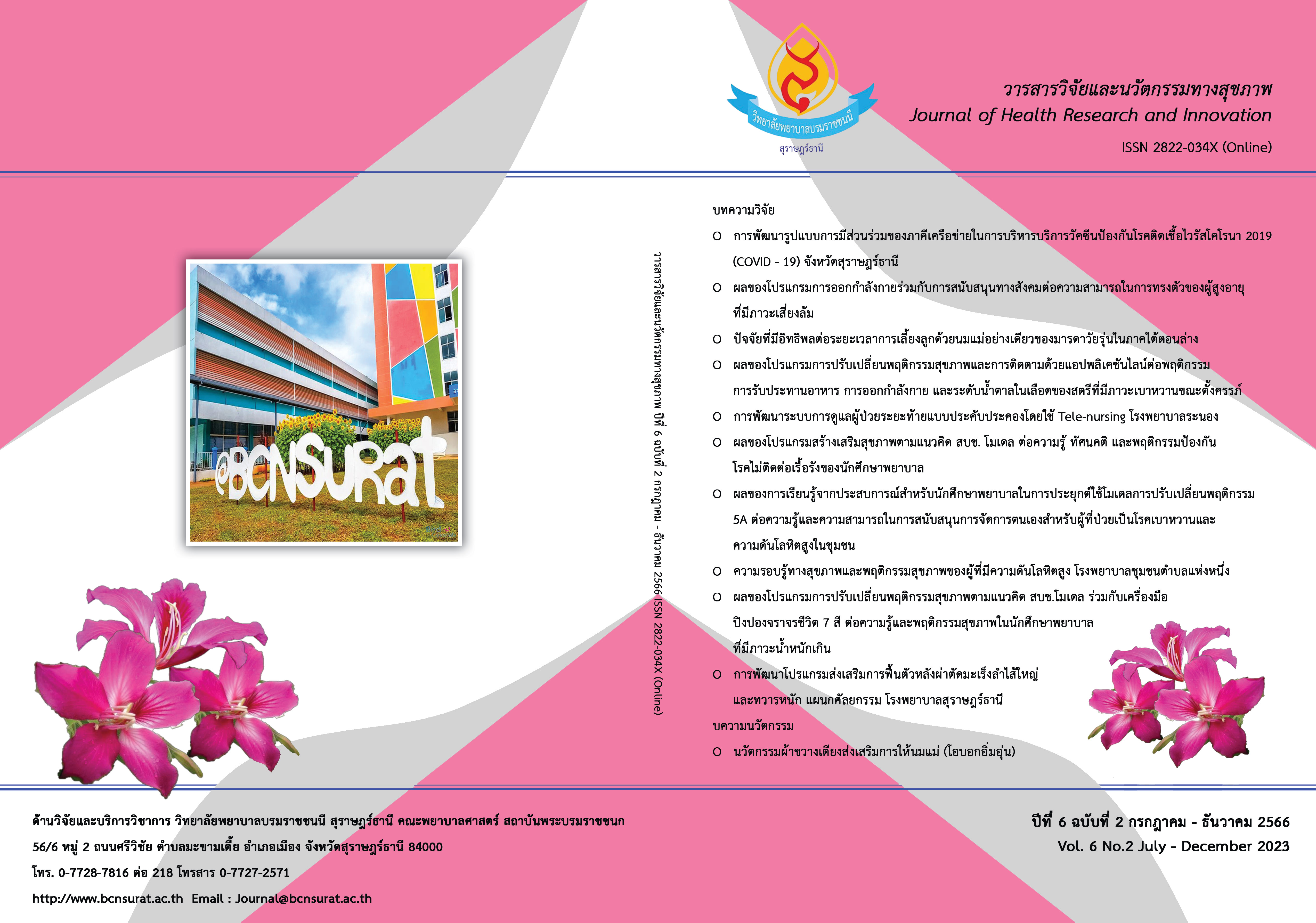ผลของโปรแกรมการปรับเปลี่ยนพฤติกรรมสุขภาพและการติดตามด้วยแอปพลิเคชันไลน์ ต่อพฤติกรรมการรับประทานอาหาร การออกกำลังกาย และระดับน้ำตาลในเลือด ของสตรีที่มีภาวะเบาหวานขณะตั้งครรภ์
คำสำคัญ:
โปรแกรมการปรับเปลี่ยนพฤติกรรมสุขภาพ, สตรีที่มีภาวะเบาหวานขณะตั้งครรภ์, แอปพลิเคชันไลน์บทคัดย่อ
การวิจัยกึ่งทดลองครั้งนี้ มีวัตถุประสงค์เพื่อศึกษาผลของโปรแกรมการปรับเปลี่ยนพฤติกรรมสุขภาพและการติดตามด้วยแอปพลิเคชันไลน์ต่อพฤติกรรมการรับประทานอาหาร การออกกำลงกาย และระดับน้ำตาลในเลือดของสตรีที่มีภาวะเบาหวานขณะตั้งครรภ์ กลุ่มตัวอย่างคือ สตรีที่มาฝากครรภ์หรือใช้บริการที่ห้องฝากครรภ์ โรงพยาบาลสุราษฎร์ธานี จำนวน 30 ราย เก็บข้อมูลระหว่างเดือนพฤษภาคม-ตุลาคม 2566 เครื่องมือที่ใช้ในการวิจัยประกอบด้วย โปรแกรมการปรับเปลี่ยนพฤติกรรมสุขภาพและการติดตามด้วยแอปพลิเคชันไลน์ เก็บรวบรวมข้อมูลด้วยแบบสอบถามข้อมูลส่วนบุคคล แบบวัดพฤติกรรมการรับประทานอาหาร แบบวัดพฤติกรรมการออกกำลังกาย ซึ่งมีค่าสัมประสิทธิ์แอลฟ่าครอนบาค เท่ากับ .86 และ .88 วิเคราะห์ข้อมูลด้วยสถิติเชิงพรรณนา และสถิติทดสอบค่าทีแบบสัมพันธ์กัน
ผลการวิจัยพบว่า ค่าเฉลี่ยคะแนนพฤติกรรมการรับประทานอาหาร และการออกกำลังกายเพิ่มขึ้นหลังใช้โปรแกรมการปรับเปลี่ยนพฤติกรรมสุขภาพและการติดตามด้วยแอปพลิเคชันไลน์อย่างมีนัยสำคัญทางสถิต (p<.01) และระดับน้ำตาลในเลือดของสตรีที่มีภาวะเบาหวานขณะตั้งครรภ์ลดลงหลังใช้โปรแกรมการปรับเปลี่ยนพฤติกรรมสุขภาพและการติดตามด้วยแอปพลิเคชันไลน์อย่างมีนัยสำคัญทางสถิต (p<.01) ดังนั้น พยาบาลผดุงครรภ์สามารถนำโปรแกรมการปรับเปลี่ยนพฤติกรรมสุขภาพและการติดตามทางแอปพลิเคชันไลน์ไปใช้ในการให้ปรับเปลี่ยนพฤติกรรมแก่หญิงตั้งครรภ์ที่เป็นภาวะเบาหวานขณะตั้งครรภ์ได้
เอกสารอ้างอิง
Adams KM, UH.,Nelson RL.Ogbum Plr.Denilenko-Dixon Dr. (1998). Sequelae of unrecognized gestational diabetes. Am J Bostet Gyneco, 176, 1321-32
Bandura. (1986). Social foundation of thought and action: A Social cognitive theory. Englewood Cliffe, NJ: Printice-Hall.
Best, J. W. (1977). Research in Education. 3rd ed. New Jersey: Prentice Hall.
Ewers B, Bruun J, Vilsbøll, T. (2019). Effects of basic carbohydrate counting versus standard out-patient nutritional education (The BCC Study): intervention study focusing on HbA1c and glucose variability in patients with type 2 diabetes. BMJ Open, 9, 1-9.
Homchui, P., Wanaratvijid., C & Pratoomsoot, C. (2020). Effect of Self-Management Support for Self-Care Behavior and Blood Glucose Level in Patients with Type 2 Diabetes Mellitus. Boromarajonani College of Nursing, Uttaradit Journal, 12(1), 240-254.
Kanfer FH, Gaelick-Bays L. (1991). Self-management method. In FH Kanfer, AP Goldsteinn, editors. Helping People change: a textbook of methods. 4th ed. New York: Pergamon press.
Kuljitjearnvong, S. (2013). LINE: Social Media on SMATR PHONE. form https://www.bu.ac.th/knowledgecenter/executive_journal/oct_dec_13/pdf/aw05.pdf
Mellitus at Maharat Nakhon Ratchasima Hospital. Thai Journal of Obstetrics and Gynecology, 22, 81-87.
Skar JB, Garnweidner-Holme LM, Lukasse M, Terragni L. (2018). Women's experiences with using a smartphone app (the Pregnant+ app) to manage gestational diabetes mellitus in a randomized controlled trial. Midwifery, 58: 102-108. doi: 10.1016/j.midw. 2017.12.021.
Sitkulanan, P, Kumtip., P. (2022). Impact of a Self-Management Programmed Monitored through the Application LINE on Eating Behavior, Arm-Swing Exercise Behavior, and Blood Glucose Levels in Women with Gestational Diabetes Mellitus. Journal of Thailand Nursing and Midwifery. 35(2), 52-69.
Srisawat, K., Sikaow, O., (2014). Management for Gestational Diabetes Mellitus. Journal of The Royal Thai Army Nurses, 15(2), 50-59.
Srithongluang S., Siriarunrat, S. & Tachasuksri, S. (2019). Effects of Self-Regulation Program on weight Control Behavior and Normal Gestational Weight Gain Based among Pregnant Women with Overweight or Obsess before Pregnancy. Journal of Nursing and Health Care, 37(4), 52-61.
Suwanpakdee, W, Youngwanichsetha, S,. & Shunuan., S (2019). Effects of a Self-Efficacy Enhancement Program on Dietary and Exercise Behaviors among Pregnant Women with Gestational Diabetes Mellitus The Southern College Network Journal of Nursing and Public Health, 6(1), 39-50.
Polit D F, Beck C T. (2012). Nursing research: Principles and methods.(9th ed.). Philadelphia, PA: Lippincott.)
Warunpitikul, R., Aswakul, O. (2014). The Incidence of Diabetes Mellitus in Pregnant Women and its Outcomes Between Pregnant Women with Diabetes Mellitus and Non- Diabetes Wang N, Deng Z, Wen LM, Ding Y, He G. (2019). Understanding the Use of Smartphone Apps for Health Information Among Pregnant Chinese Women: Mixed Methods Study. JMIR. health Uhealth, 7(6):e12631.doi: 10.2196/12631.
ZhuY, Zhang C. (2016). Prevalenceof gestational diabetes and riskof progression totype 2 diabetes: a global perspective. Current Diabetes Reports ,16(1):7. doi: 10.1007/s11892-015-0699-x
Zurawska-Klisl, M., Kosinskil, M., Wender-Ozegowska, E., Bartyzel, L., Matysiak, E., Olak-Bialon, B., et al. (2016). Obstetric Results of the Multicenter, Nationwide, Scientific-Educational Program for Pregnant Women with Gestational Diabetes Mellitus (GDM). Ginekologia Polska, 8, 651–658.
ดาวน์โหลด
เผยแพร่แล้ว
รูปแบบการอ้างอิง
ฉบับ
ประเภทบทความ
สัญญาอนุญาต
ลิขสิทธิ์ (c) 2023 วิทยาลัยพยาบาลบรมราชชนนี สุราษฎร์ธานี

อนุญาตภายใต้เงื่อนไข Creative Commons Attribution-NonCommercial-NoDerivatives 4.0 International License.
บทความที่ได้รับการตีพิมพ์เป็นลิขสิทธิ์ของวารสารวิทยาลัยพยาบาลบรมราชชนนี สุราษฎร์ธานี
ข้อความที่ปรากฏในบทความแต่ละเรื่องในวารสารวิชาการนี้เป็นความคิดเห็นส่วนตัวของผู้เขียนแต่ละท่านไม่เกี่ยวข้องกับวิทยาลัยพยาบาลบรมราชชนนี สุราษฎร์ธานี และคณาจารย์ท่านอื่นๆในวิทยาลัยฯ แต่อย่างใด ความรับผิดชอบองค์ประกอบทั้งหมดของบทความแต่ละเรื่องเป็นของผู้เขียนแต่ละท่าน หากมีความผิดพลาดใดๆ ผู้เขียนแต่ละท่านจะรับผิดชอบบทความของตนเองแต่ผู้เดียว



